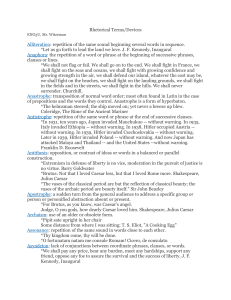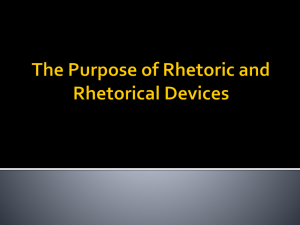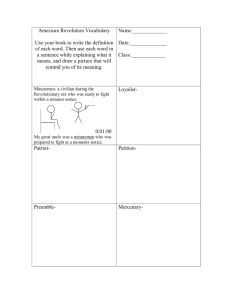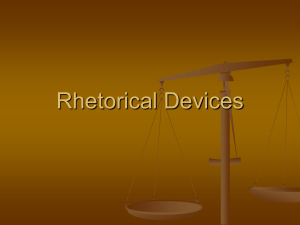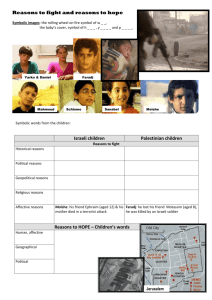Literary Terms Apostrophe--the addressing of a usually absent
advertisement
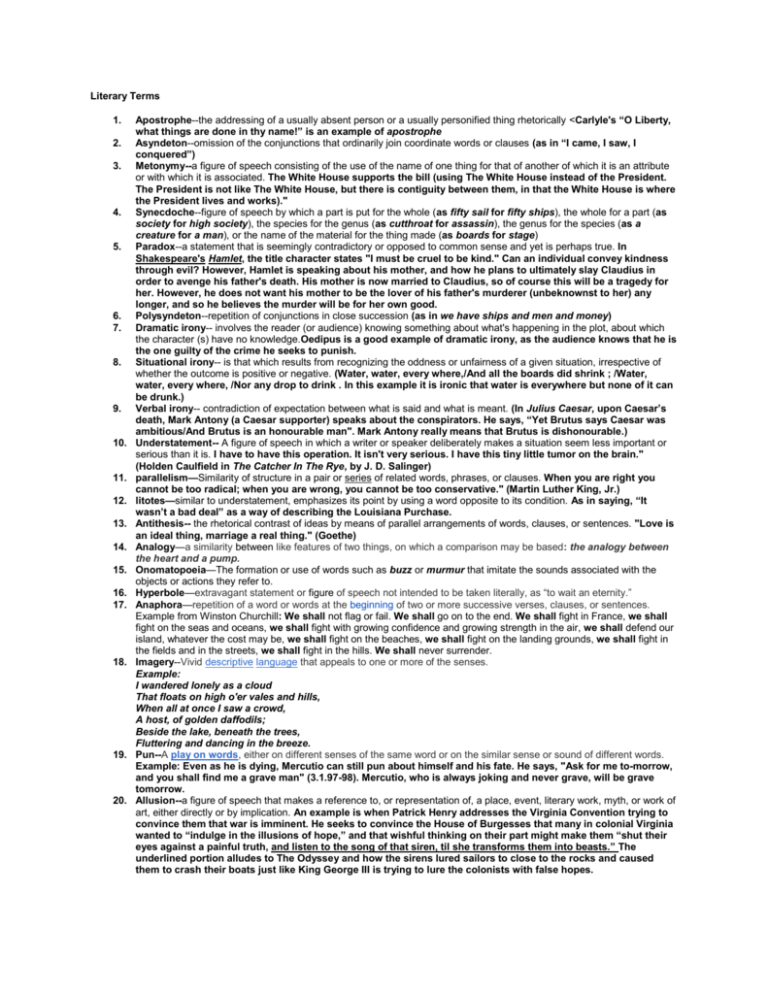
Literary Terms 1. 2. 3. 4. 5. 6. 7. 8. 9. 10. 11. 12. 13. 14. 15. 16. 17. 18. 19. 20. Apostrophe--the addressing of a usually absent person or a usually personified thing rhetorically <Carlyle's “O Liberty, what things are done in thy name!” is an example of apostrophe Asyndeton--omission of the conjunctions that ordinarily join coordinate words or clauses (as in “I came, I saw, I conquered”) Metonymy--a figure of speech consisting of the use of the name of one thing for that of another of which it is an attribute or with which it is associated. The White House supports the bill (using The White House instead of the President. The President is not like The White House, but there is contiguity between them, in that the White House is where the President lives and works)." Synecdoche--figure of speech by which a part is put for the whole (as fifty sail for fifty ships), the whole for a part (as society for high society), the species for the genus (as cutthroat for assassin), the genus for the species (as a creature for a man), or the name of the material for the thing made (as boards for stage) Paradox--a statement that is seemingly contradictory or opposed to common sense and yet is perhaps true. In Shakespeare's Hamlet, the title character states "I must be cruel to be kind." Can an individual convey kindness through evil? However, Hamlet is speaking about his mother, and how he plans to ultimately slay Claudius in order to avenge his father's death. His mother is now married to Claudius, so of course this will be a tragedy for her. However, he does not want his mother to be the lover of his father's murderer (unbeknownst to her) any longer, and so he believes the murder will be for her own good. Polysyndeton--repetition of conjunctions in close succession (as in we have ships and men and money) Dramatic irony-- involves the reader (or audience) knowing something about what's happening in the plot, about which the character (s) have no knowledge.Oedipus is a good example of dramatic irony, as the audience knows that he is the one guilty of the crime he seeks to punish. Situational irony-- is that which results from recognizing the oddness or unfairness of a given situation, irrespective of whether the outcome is positive or negative. (Water, water, every where,/And all the boards did shrink ; /Water, water, every where, /Nor any drop to drink . In this example it is ironic that water is everywhere but none of it can be drunk.) Verbal irony-- contradiction of expectation between what is said and what is meant. (In Julius Caesar, upon Caesar’s death, Mark Antony (a Caesar supporter) speaks about the conspirators. He says, “Yet Brutus says Caesar was ambitious/And Brutus is an honourable man". Mark Antony really means that Brutus is dishonourable.) Understatement-- A figure of speech in which a writer or speaker deliberately makes a situation seem less important or serious than it is. I have to have this operation. It isn't very serious. I have this tiny little tumor on the brain." (Holden Caulfield in The Catcher In The Rye, by J. D. Salinger) parallelism—Similarity of structure in a pair or series of related words, phrases, or clauses. When you are right you cannot be too radical; when you are wrong, you cannot be too conservative." (Martin Luther King, Jr.) litotes—similar to understatement, emphasizes its point by using a word opposite to its condition. As in saying, “It wasn’t a bad deal” as a way of describing the Louisiana Purchase. Antithesis-- the rhetorical contrast of ideas by means of parallel arrangements of words, clauses, or sentences. "Love is an ideal thing, marriage a real thing." (Goethe) Analogy—a similarity between like features of two things, on which a comparison may be based: the analogy between the heart and a pump. Onomatopoeia—The formation or use of words such as buzz or murmur that imitate the sounds associated with the objects or actions they refer to. Hyperbole—extravagant statement or figure of speech not intended to be taken literally, as “to wait an eternity.” Anaphora—repetition of a word or words at the beginning of two or more successive verses, clauses, or sentences. Example from Winston Churchill: We shall not flag or fail. We shall go on to the end. We shall fight in France, we shall fight on the seas and oceans, we shall fight with growing confidence and growing strength in the air, we shall defend our island, whatever the cost may be, we shall fight on the beaches, we shall fight on the landing grounds, we shall fight in the fields and in the streets, we shall fight in the hills. We shall never surrender. Imagery--Vivid descriptive language that appeals to one or more of the senses. Example: I wandered lonely as a cloud That floats on high o'er vales and hills, When all at once I saw a crowd, A host, of golden daffodils; Beside the lake, beneath the trees, Fluttering and dancing in the breeze. Pun--A play on words, either on different senses of the same word or on the similar sense or sound of different words. Example: Even as he is dying, Mercutio can still pun about himself and his fate. He says, "Ask for me to-morrow, and you shall find me a grave man" (3.1.97-98). Mercutio, who is always joking and never grave, will be grave tomorrow. Allusion--a figure of speech that makes a reference to, or representation of, a place, event, literary work, myth, or work of art, either directly or by implication. An example is when Patrick Henry addresses the Virginia Convention trying to convince them that war is imminent. He seeks to convince the House of Burgesses that many in colonial Virginia wanted to “indulge in the illusions of hope,” and that wishful thinking on their part might make them “shut their eyes against a painful truth, and listen to the song of that siren, til she transforms them into beasts.” The underlined portion alludes to The Odyssey and how the sirens lured sailors to close to the rocks and caused them to crash their boats just like King George III is trying to lure the colonists with false hopes. 21. Simile-- A simile is a comparison of two things using "like" or "as." For an example we can turn to the Pulitzer Prizewinning novel The Optimist's Daughter by Eudora Welty: "Windshields flashed into her eyes like light through tears." 22. Metaphor- A metaphor is a pattern equating two seemingly unlike objects. An example of a metaphor is or “All the world's a stage” or 'drowning in debt'. A metaphor is an implied comparison ( Snow white fleece ) as opposed to a direct comparison in a Simile ( Fleece as white as snow).23. Personification—where an inanimate object or abstraction is given human qualities or abilities. "Fear knocked on the door. Faith answered. There was no one there."(proverb quoted by Christopher Moltisanti, The Sopranos) 24. Alliteration-- Alliteration is the repetition of the same or similar sounds at the beginning of words such as tongue twisters like 'She sells seashells by the seashore'. The poem "Acquainted with the Night" by Robert Frost provides a good example of alliteration. I have stood still and stopped the sound of feet/When far away an interrupted cry/Came over houses from another street. 25. Symbol-- in general terms, anything that stands for something else. Obvious examples are flags, which symbolize a nation; the cross is a symbol for Christianity; Uncle Sam a symbol for the United States. In literature, a symbol is expected to have significance. Keats starts his ode with a real nightingale, but quickly it becomes a symbol, standing for a life of pure, unmixed joy; then before the end of the poem it becomes only a bird again.
